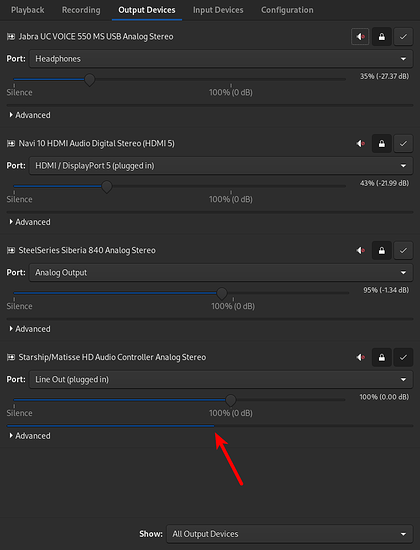I haven’t tried your patch, as I already implemented my own working solution posted above, but for what it’s worth…
Card #0
Name: alsa_card.pci-0000_01_00.1
Driver: module-alsa-card.c
Owner Module: 7
Properties:
alsa.card = "1"
alsa.card_name = "HDA NVidia"
alsa.long_card_name = "HDA NVidia at 0x53080000 irq 17"
alsa.driver_name = "snd_hda_intel"
device.bus_path = "pci-0000:01:00.1"
sysfs.path = "/devices/pci0000:00/0000:00:01.0/0000:01:00.1/sound/card1"
device.bus = "pci"
device.vendor.id = "10de"
device.vendor.name = "NVIDIA Corporation"
device.product.id = "10ef"
device.product.name = "GP102 HDMI Audio Controller"
device.string = "1"
device.description = "GP102 HDMI Audio Controller"
module-udev-detect.discovered = "1"
device.icon_name = "audio-card-pci"
Profiles:
output:hdmi-stereo: Digital Stereo (HDMI) Output (sinks: 1, sources: 0, priority: 5400, available: no)
output:hdmi-surround: Digital Surround 5.1 (HDMI) Output (sinks: 1, sources: 0, priority: 300, available: no)
output:hdmi-surround71: Digital Surround 7.1 (HDMI) Output (sinks: 1, sources: 0, priority: 300, available: no)
output:hdmi-stereo-extra1: Digital Stereo (HDMI 2) Output (sinks: 1, sources: 0, priority: 5200, available: no)
output:hdmi-surround-extra1: Digital Surround 5.1 (HDMI 2) Output (sinks: 1, sources: 0, priority: 100, available: no)
output:hdmi-surround71-extra1: Digital Surround 7.1 (HDMI 2) Output (sinks: 1, sources: 0, priority: 100, available: no)
output:hdmi-stereo-extra2: Digital Stereo (HDMI 3) Output (sinks: 1, sources: 0, priority: 5200, available: no)
output:hdmi-surround-extra2: Digital Surround 5.1 (HDMI 3) Output (sinks: 1, sources: 0, priority: 100, available: no)
output:hdmi-surround71-extra2: Digital Surround 7.1 (HDMI 3) Output (sinks: 1, sources: 0, priority: 100, available: no)
output:hdmi-stereo-extra3: Digital Stereo (HDMI 4) Output (sinks: 1, sources: 0, priority: 5200, available: no)
output:hdmi-surround-extra3: Digital Surround 5.1 (HDMI 4) Output (sinks: 1, sources: 0, priority: 100, available: no)
output:hdmi-surround71-extra3: Digital Surround 7.1 (HDMI 4) Output (sinks: 1, sources: 0, priority: 100, available: no)
off: Off (sinks: 0, sources: 0, priority: 0, available: yes)
Active Profile: off
Ports:
hdmi-output-0: HDMI / DisplayPort (priority: 5900, latency offset: 0 usec, not available)
Properties:
device.icon_name = "video-display"
Part of profile(s): output:hdmi-stereo, output:hdmi-surround, output:hdmi-surround71
hdmi-output-1: HDMI / DisplayPort 2 (priority: 5800, latency offset: 0 usec, not available)
Properties:
device.icon_name = "video-display"
Part of profile(s): output:hdmi-stereo-extra1, output:hdmi-surround-extra1, output:hdmi-surround71-extra1
hdmi-output-2: HDMI / DisplayPort 3 (priority: 5700, latency offset: 0 usec, not available)
Properties:
device.icon_name = "video-display"
Part of profile(s): output:hdmi-stereo-extra2, output:hdmi-surround-extra2, output:hdmi-surround71-extra2
hdmi-output-3: HDMI / DisplayPort 4 (priority: 5600, latency offset: 0 usec, not available)
Properties:
device.icon_name = "video-display"
Part of profile(s): output:hdmi-stereo-extra3, output:hdmi-surround-extra3, output:hdmi-surround71-extra3
Card #1
Name: alsa_card.pci-0000_00_1f.3
Driver: module-alsa-card.c
Owner Module: 8
Properties:
alsa.card = "0"
alsa.card_name = "HDA Intel PCH"
alsa.long_card_name = "HDA Intel PCH at 0x53930000 irq 171"
alsa.driver_name = "snd_hda_intel"
device.bus_path = "pci-0000:00:1f.3"
sysfs.path = "/devices/pci0000:00/0000:00:1f.3/sound/card0"
device.bus = "pci"
device.vendor.id = "8086"
device.vendor.name = "Intel Corporation"
device.product.id = "a348"
device.form_factor = "internal"
device.string = "0"
device.description = "Built-in Audio"
module-udev-detect.discovered = "1"
device.icon_name = "audio-card-pci"
Profiles:
input:analog-stereo: Analog Stereo Input (sinks: 0, sources: 1, priority: 60, available: yes)
output:analog-stereo: Analog Stereo Output (sinks: 1, sources: 0, priority: 6000, available: yes)
output:analog-stereo+input:analog-stereo: Analog Stereo Duplex (sinks: 1, sources: 1, priority: 6060, available: yes)
output:analog-surround-21: Analog Surround 2.1 Output (sinks: 1, sources: 0, priority: 800, available: yes)
output:analog-surround-21+input:analog-stereo: Analog Surround 2.1 Output + Analog Stereo Input (sinks: 1, sources: 1, priority: 860, available: yes)
output:analog-surround-40: Analog Surround 4.0 Output (sinks: 1, sources: 0, priority: 700, available: yes)
output:analog-surround-40+input:analog-stereo: Analog Surround 4.0 Output + Analog Stereo Input (sinks: 1, sources: 1, priority: 760, available: yes)
output:analog-surround-41: Analog Surround 4.1 Output (sinks: 1, sources: 0, priority: 800, available: yes)
output:analog-surround-41+input:analog-stereo: Analog Surround 4.1 Output + Analog Stereo Input (sinks: 1, sources: 1, priority: 860, available: yes)
output:analog-surround-50: Analog Surround 5.0 Output (sinks: 1, sources: 0, priority: 700, available: yes)
output:analog-surround-50+input:analog-stereo: Analog Surround 5.0 Output + Analog Stereo Input (sinks: 1, sources: 1, priority: 760, available: yes)
output:analog-surround-51: Analog Surround 5.1 Output (sinks: 1, sources: 0, priority: 800, available: yes)
output:analog-surround-51+input:analog-stereo: Analog Surround 5.1 Output + Analog Stereo Input (sinks: 1, sources: 1, priority: 860, available: yes)
output:iec958-stereo: Digital Stereo (IEC958) Output (sinks: 1, sources: 0, priority: 5500, available: yes)
output:iec958-stereo+input:analog-stereo: Digital Stereo (IEC958) Output + Analog Stereo Input (sinks: 1, sources: 1, priority: 5560, available: yes)
off: Off (sinks: 0, sources: 0, priority: 0, available: yes)
Active Profile: output:analog-stereo+input:analog-stereo
Ports:
analog-input-front-mic: Front Microphone (priority: 8500, latency offset: 0 usec, not available)
Properties:
device.icon_name = "audio-input-microphone"
Part of profile(s): input:analog-stereo, output:analog-stereo+input:analog-stereo, output:analog-surround-21+input:analog-stereo, output:analog-surround-40+input:analog-stereo, output:analog-surround-41+input:analog-stereo, output:analog-surround-50+input:analog-stereo, output:analog-surround-51+input:analog-stereo, output:iec958-stereo+input:analog-stereo
analog-input-rear-mic: Rear Microphone (priority: 8200, latency offset: 0 usec, not available)
Properties:
device.icon_name = "audio-input-microphone"
Part of profile(s): input:analog-stereo, output:analog-stereo+input:analog-stereo, output:analog-surround-21+input:analog-stereo, output:analog-surround-40+input:analog-stereo, output:analog-surround-41+input:analog-stereo, output:analog-surround-50+input:analog-stereo, output:analog-surround-51+input:analog-stereo, output:iec958-stereo+input:analog-stereo
analog-input-linein: Line In (priority: 8100, latency offset: 0 usec, available)
Part of profile(s): input:analog-stereo, output:analog-stereo+input:analog-stereo, output:analog-surround-21+input:analog-stereo, output:analog-surround-40+input:analog-stereo, output:analog-surround-41+input:analog-stereo, output:analog-surround-50+input:analog-stereo, output:analog-surround-51+input:analog-stereo, output:iec958-stereo+input:analog-stereo
analog-output-lineout: Line Out (priority: 9900, latency offset: 0 usec, available)
Part of profile(s): output:analog-stereo, output:analog-stereo+input:analog-stereo, output:analog-surround-21, output:analog-surround-21+input:analog-stereo, output:analog-surround-40, output:analog-surround-40+input:analog-stereo, output:analog-surround-41, output:analog-surround-41+input:analog-stereo, output:analog-surround-50, output:analog-surround-50+input:analog-stereo, output:analog-surround-51, output:analog-surround-51+input:analog-stereo
analog-output-headphones: Headphones (priority: 9000, latency offset: 0 usec, not available)
Properties:
device.icon_name = "audio-headphones"
Part of profile(s): output:analog-stereo, output:analog-stereo+input:analog-stereo
iec958-stereo-output: Digital Output (S/PDIF) (priority: 0, latency offset: 0 usec)
Part of profile(s): output:iec958-stereo, output:iec958-stereo+input:analog-stereo




 Is that perhaps an intentional side effect of the patch?
Is that perhaps an intentional side effect of the patch?